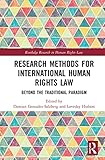Research methods for international human rights law : beyond the traditional paradigm / edited by Damian Gonzalez-Salzberg and Loveday Hodson.
Contributor(s): Gonzalez-Salzberg, Damian A [editor.] | Hodson, Loveday [editor.].
Publisher: UK : Routledge, 2020Description: viii, 279p.ISBN: 9781138603554.Subject(s): International law and human rights -- Cases | International law and human rights -- MethodologyDDC classification: 341.48| Item type | Current location | Call number | Status | Date due | Barcode |
|---|---|---|---|---|---|
 Books
Books
|
NASSDOC Library | 341.48 RES- (Browse shelf) | Available | 53544 |
Includes bibliographical references and index.
Introduction : human rights research beyond the doctrinal approach / Damian A. Gonzalez-Salzberg & Loveday Hodson -- A Marxist approach to R.M.T. v the United Kingdom / Robert Knox -- A feminist approach to Alyne da Silva Pimentel Teixeira (deceased) v Brazil / Loveday Hodson -- A postmodern approach to Elisabeta Dano v Jobcenter Leipzig / Bal Sokhi-Bulley -- A queer approach to the advisory opinion 24/2017 / Damian Gonzalez-Salzberg -- A legal pluralistic approach to the Bakassi peninsula case / Jennifer Hendry -- A geographical approach to the Moiwana Community v Suriname / Ana Zavala-Guillen -- A historical approach to Chagos Islanders v the United Kingdom / Henry Jones -- A political approach to Lautsi and others [GC] v Italy / Dimitrios Tsarapatsanis -- An anthropological approach to MSS v Belgium and Greece / Marie-Bénédicte Dembour -- Afterword / Conor Gearty.
The study and teaching of international human rights law is dominated by the doctrinal method. A wealth of alternative approaches exists, but they tend to be discussed in isolation from one another. This collection focuses on cross-theoretical discussion that brings together an array of different analytical methods and theoretical lenses that can be used for conducting research within the field. As such, it provides a coherent, accessible and diverse account of key theories and methods. A distinctive feature of this collection is that it adopts a grounded approach to international human rights law, through demonstrating the application of specific research methods to individual case studies. By applying the approach under discussion to a concrete case it is possible to better appreciate the multiple understandings of international human rights law that are missed when the field is only comprehended though the doctrinal method. Furthermore, since every contribution follows the same uniform structure, this allows for fruitful comparison between different approaches to the study of our discipline.
English.


There are no comments for this item.